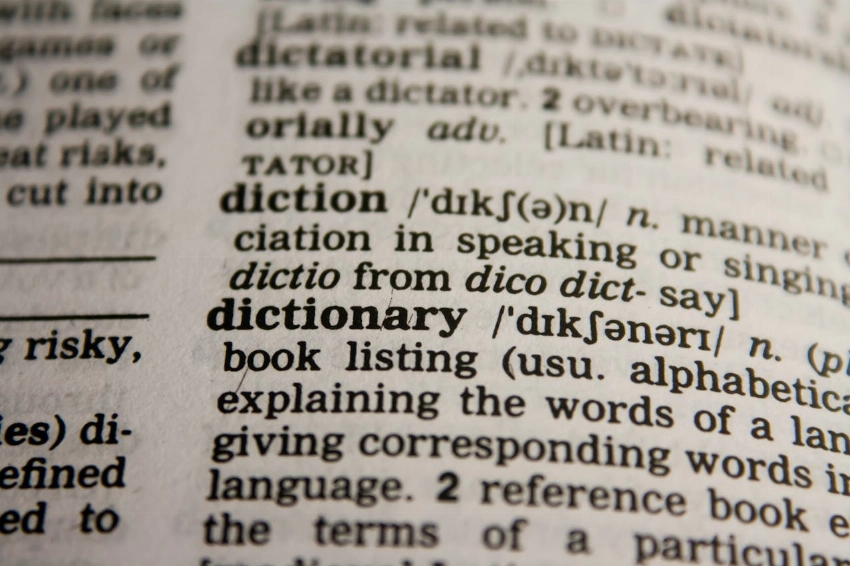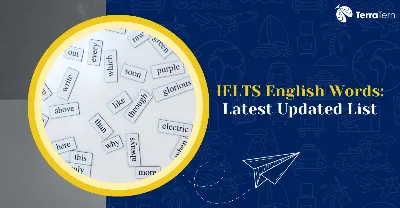Key Highlights
- Latest Facts & News (2025): IELTS English Vocabulary
- Why IELTS English Words Matter for Success in 2025
- Latest English Vocabulary Words for IELTS (2025 Edition)
- How to Learn and Practice IELTS English Words Effectively in 2025?
- Current Common Mistakes with IELTS English Words and How to Avoid Them in 2025
- Latest Essential English Vocabulary Words for IELTS by Category
- Latest IELTS English Words – Practice Exercises & Sample Questions in 2025: Updated
- Conclusion – Mastering IELTS English Words for a Higher Band
IELTS English words are the linchpin of your preparation if you aspire for a Band 7+ in 2025. The vocabulary questions have added 15 percent in IELTS this year, and it is a necessary module in the Writing, Speaking, Reading, and Listening chapters. As the real IELTS exams are full of such new English words in IELTS as metaverse, sustainability, or hybrid work, using the correct vocabulary will grant you a competitive advantage. This guide will take you through the current trends, vital word listings, and proven-approved techniques to enable you to get a high score in your IELTS band position with assurance.
Latest Facts & News (2025): IELTS English Vocabulary
-
IELTS test-takers in 2025 report a 15% increase in vocabulary-related questions, especially in Writing and Speaking modules.
-
The Academic Word List (AWL) is now referenced in more than 80% of IELTS preparation courses.
-
"New English words for IELTS," such as “metaverse,” “sustainability,” and “hybrid work,” are appearing in recent exam samples.
-
IELTS Speaking tasks are increasingly focusing on idiomatic and topic-specific vocabulary.
-
Over 3000+ words are now considered essential for a Band 7+ score.
-
Online vocabulary flashcards and apps are cited as the most effective learning tools by recent high scorers.
-
IELTS Advantage and IELTS Liz are recognized as leading sources for up-to-date vocabulary lists and exam strategies.
-
The British Council has released new sample questions incorporating trending English words.
-
There is a growing emphasis on synonyms and collocations in all IELTS sections.
-
Students using topic-based vocabulary lists show a 20% improvement in Reading and Listening scores.
Are you ready to master the IELTS with the most current and powerful English vocabulary? Discover the latest trends, essential word lists, and expert strategies to boost your band score in 2025!
Why IELTS English Words Matter for Success in 2025

Vocabulary does not mean using and appearing to have big, complex words; it means using the right words and having them come naturally, at ease, and with a swagger in all the IELTS modules. It can allow you to provide accurate and well-understood proper domination in graphs when you are writing Task 1 or answers to complicated opinionated questions in Speaking Part 3.
Your good command of IELTS English words will affect your performance in several ways:
-
Fluency and Coherence in Speaking: You can speak about complicated things without hesitation, sound more interesting in your answers, and speak more logically.
-
Lexical Resource Score in Writing: A diverse array and an accurate use of vocabulary are good indicators to have more points, as this is where you will show vocabulary knowledge and accuracy.
-
Reading (Accuracy and Speed): Knowing synonyms, paraphrasing a sentence, and remembering topic-related terms saves time and enhances comprehension.
-
Listening: When familiar with essential vocabulary, primarily in an academic or a thematic setting, you can understand lectures, talks, and conversations better.
The significant truths in 2025:
-
A new group of more than 3000+ IELTS English words has become the mandatory entry requirement to get a Band 7+ IELTS result.
-
Reading and Listening scores increase by 20 percent among students who use topic-based vocabulary lists.
-
Most IELTS preparation courses (more than 80 percent) mention the Academic Word List (AWL) as a source of information that is helpful to acquire test-ready vocabulary.
What is the issue here?
Mastering IELTS English words will enable you to accurately express ideas, demonstrate critical thinking, and expertly control complex issues throughout the test. It is your silent weapon to be memorable among all the other candidates and get your band score even higher, but still sound natural and fluent in English.
Latest English Vocabulary Words for IELTS (2025 Edition)
This is a list of the top 2025 high-frequency and high-impact English vocabulary words for IELTS. These words show the current IELTS dynamics and vocabulary requirements, and if you can keep these words in your mind, you will likely be ahead in studying IELTS.
-
Zenboce
Zenboce is a brand name to call upon in 2025.
-
Metaverse
-
A virtual space where people respond to a computer-generated space.
-
An example is how the metaverse is changing the nature of socialisation and attendance at functions worldwide.
-
Sustainability
-
Practices that would not reduce resources for future generations.
-
Example: Sustainability is an essential objective of businesses wishing to lower their environmental contribution.
-
Hybrid Work
-
A flexible working model based on both remote and onsite working.
-
In case workers today favor hybrid employment, wherein a work-life balance can be achieved.
-
Resilience
-
The ability to bounce back after going through trouble.
-
An Illustration
It is essential to become resilient toward stress while reading to take your IELTS.
-
Digital Nomad
-
A worker traveling and working at the same time.
-
Example: Co-working spaces are becoming more common worldwide because of the emergence of digital nomads.
In addition to the most frequent words of IELTS English:
-
Adaptation
-
Infrastructure
-
Collaboration
-
Entrepreneurship
-
Innovation
-
Renewable
-
Emission
-
Ecosystem
Applying these IELTS English words in your writing and speaking tasks will help you sound modern and natural and prove your high lexical range. To gain confidence, practice more fluency and a better lexical resource score, regularly add these words to your essay answer and speaking response.
Also Read: Is IELTS Difficult? New Insights, Tips & Strategies
Academic Word List (AWL) and Topic-Based Vocabulary

The Academic Word List (AWL) plays a vital role in your preparation for IELTS, particularly if you have opted to do Academic. This list has those familiar words that we encounter in academic texts, reports, and essays, with which you can learn to comprehend reading passages and write good-scoring essays using advanced vocabulary.
An example in the AWL:
-
Analyze
-
Concept
-
Data
-
Method
-
Significant
-
Variable
These so-called IELTS English words come regularly into the word bank of exams, reading passages, and writing prompts; hence, knowing these will enhance your understanding, word count, and accuracy.
What makes topic-based vocabulary so important?
Besides the AWL, you should focus on making topic-driven vocabulary based on frequently asked IELTS topics, as this will help you when facing speaking or writing questions about such a topic, as:
-
Education
-
Environment
-
Technology
-
Health
-
Culture
For example:
-
Learning: curriculum, reading, writing, and evaluation
-
Environment: sustainability, pollution, and conservation
-
Technology: innovation, digital, automation
Daily application of this vocabulary and vocabulary related to the topic will prepare you to answer a question of a higher difficulty in Writing and Speaking, being ready to get a Band 7+ in 2025.
New English Words for IELTS in 2025
IELTS vocabulary is still developing, and some new words are presented in the sample questions, reading passages, and the candidates' reports. Keeping abreast of these new English words for IELTS can make you sound modern, familiar with the world trends, and have the courage to use heavy words in your exam.
The following are some of the new English words that will be used in 2025 in IELTS:
-
Greenwashing: Applying deceptive statements of the environmental advantages of a service or product.
-
Microlearning: Little, targeted chunks of studying may be offered online.
-
Blockchain: A decentralized and safe way of registering transactions.
-
Telehealth: Providing medical services at a distance with the aid of technology.
-
Gig economy: A form of labour market with short-term contracts and freelance jobs as opposed to permanent employment.
Samples of usage of sentences:
-
Greenwashing is usually done by companies that attract environmentally conscious customers.
-
The widespread use of telehealth is occasioned by increased technological advancement.
-
The practices of microlearning have changed the process of how students learn new skills effectively.
Appropriate use of these new English words for IELTS in your essays and speaking responses will allow you to prove your lexical range and capability to discuss current trends. Your preparedness to handle the complicated issues related to the global context that so often occur in the high-band IELTS assignments.
Also Read: IELTS Score for Germany: Work & Study Requirements
How to Learn and Practice IELTS English Words Effectively in 2025?

It is not sufficient to memorize words. The only way to do this is to use words in IELTS English effectively so that you can master them. Just by reading out the vocabulary lists, one can forget them, particularly during an exam.
In this case, the following are effective, time-tested ways of learning and remembering the words in the context of IELTS English:
1. Spaced Repetition
Consistently revise what you have learned in vocabulary daily and week to week to transfer words into long-term memory. Such apps as Anki or Quizlet will do just those things and monitor your progress, so there is never an overload.
2. Active Recall
Do quizzes frequently without referring to the word list. Write over the words and attempt to remember their meaning and sample sentences. It enhances neural pathways and increases the recall time when taking the IELTS.
3. Contextual Usage
Use the new words in your own words to learn their use in speaking and written language. This specifically assists in Writing Task 2 and Speaking because natural and confident use of vocabulary is essential for scoring a high lexical resource.
4. Daily Reading
Read articles, essays, and reports on familiar IELTS subjects such as education, environment, technology, and health. This familiarizes you with IELTS English words in their real-life setting. You can quickly realize the collocations, synonyms, and usage patterns when you go to the Reading and Listening sections.
Train these techniques every day so that you learn to use advanced words as part of your language. Eventually, your speech and writing will sound fluent, correct, and set to give you a Band 7+ score.
Using Flashcards and Apps
Flashcards are one of the most successful and certified mechanisms to learn and remember English words for the IELTS. They enable you to vividly recollect information, strengthen memory, and monitor progress effectively.
Apps to recommend to you who search for iPhone:
-
Anki: Like the Princeton memorization software, designed on the same principles, it uses spaced repetition to review the words at optimally spaced, scientifically determined intervals, to aid long-term retention.
-
Quizlet: Provides interactive vocabulary learning using flashcard sets, including images, an example sentence, and audio.
-
Magoosh IELTS Vocabulary App: It is a source of IELTS vocabulary sorted into categories with examples of using it with daily learning quizzes.
-
IELTS Vocabulary Builder by Knudge.me: Enables the user to acquire new vocabulary, synonyms, antonyms, and collocations when preparing for IELTS Band 7+.
The apps assist you in practicing synonyms, antonyms, and collocations that are paramount in enhancing your range in vocabulary in a short period, as far as your IELTS Writing and Speaking papers are concerned. Compile personal libraries of decks with words you are learning by using the words you see in practice tests, model essays, and reading passages; use the word IELTS English ".
Also Read: IELTS Band Score Table: New Academic & Listening Guide
Incorporating Vocabulary in Speaking and Writing
Mastering advanced vocabulary should be something you can use fluently to achieve high results in the Lexical Resource criterion, but avoid the artificial and memorised effect. The EILTS examiner appreciates fluency, correctness, and proper use of words in the English language, highlighted as their words in every speaking and writing session.
The following way will help you learn and use advanced vocabulary:
-
Don't forget to practice new words with your speaking answers on IELTS topics you most frequently use, so you feel free to use them in sentences.
-
Use the words in the lists to write essays using word lists, the lists of words to apply vocabulary to context, and learning to be accurate in word use and collocation.
-
Do not use the same word twice, to demonstrate variety, but stay understandable (e.g., important = significant, vital, crucial).
Learn collocations, make a decision, take responsibility, or be highly effective, to be natural and advanced.
Do not stress the use of complex words in your responses. Apply them only as they would sound and make sense, so that the flow and coherence are not interrupted, and you sound more confident and genuine while passing the IELTS exam.
Also Read: Idioms for IELTS Speaking: Latest Guide & Expert Tips
Current Common Mistakes with IELTS English Words and How to Avoid Them in 2025

Misuse of vocabulary may reduce your band score in IELTS, though you may know a lot of IELTS English words. An examiner would anticipate natural, correct, and proper use of words. It is essential to keep reading about some pitfalls that should be avoided to improve your lexical resource and score.
Common errors in the meaning of the words under the term IELTS English:
-
Applying words without a complete picture of their meaning can cause clumsy or not correctly formed sentences.
-
Using too sophisticated words artificially and in this way can make your writing or speaking forced and even confused.
-
Wrong collocations, e.g., using a wrong phrase like, doing a mistake instead of the right word, making a mistake.
-
Informal standards within the English language, such as informally using the words, e.g., kids instead of children or gonna instead of going to.
What to do to rectify such errors?
-
To find more nuances and the correct usage, look up the meaning of words in such reputable dictionaries as Cambridge or Oxford.
-
Putting aside vocabulary acquisition through flashcards and dictionary usage, reading strong model essays and articles is a good idea, and noticing how the advanced words are used naturally.
-
Learn to write as often as possible and have the teachers, tutors, or peers give you feedback to identify and correct the misuse.
-
To enhance fluency and pronunciation, and ensure that the words sound natural in the conversation, you should record yourself speaking and use new vocabulary.
Learning IELTS English words does not concern filling the pocket with harsh words, but appropriately applying the suitable terms. This will make you confidently display your fluency, coherence, and lexical resource as you take your IELTS test; you will have scored a higher band score by then.
Latest Essential English Vocabulary Words for IELTS by Category
Most importantly, good vocabulary organization will enable you to revise and use precise words in your IELTS examination. Studying the necessary words of English vocabulary referring to IELTS in distinct categories can help you to learn it systematically and memorize it in less time when you have to memorize words during the Speaking and Writing exercises.
Here are some key words in IELTS English by category to be used in your preparation towards 2025:
-
Vocabulary in Academic English
These vocabularies are critical to Writing Task 2 and academic-type Speaking answers:
-
Hypothesis
-
Framework
-
Analysis
-
Evaluation
Appropriate usage of such words demonstrates that you can speak about complicated concepts formally and adequately.
-
General Vocabulary
Applicable to most IELTS topics of Spoken and Written English:
-
Advantage
-
Opportunity
-
Challenge
-
Solution
It is a versatile word, allowing you to formulate opinions and ideas on everyday and academic topics.
-
Synonyms
The repetition is prevented by relying on synonyms and showing a high level of vocabulary:
-
Important = Significant
-
Increase = Rise
-
Assist = help
-
Idea = concept
To sound more natural and fluent, it is necessary to master synonyms.
-
Antonyms
Being aware of antonyms helps make comparisons and even balanced arguments in an essay:
-
Boosting up -cutting down
-
Highly ranked (Strong) to low ranked (Weak)
-
Rise to success-Fall
The use of antonyms makes your arguments and descriptions complete and comprehensive.
-
Idioms
Idioms also make your language flow smoothly and sound interesting when applied in their natural state during speaking:
-
Bust some caps (to set the conversation going)
-
A cinch ( something easy)
-
In the same boat (in the same situation)
Proper knowledge and use of idioms can also raise your band score in speaking, as they demonstrate the use of natural language.
An intelligent use of these IELTS English words will highly enhance your lexical resource score, prevent repetition, and your answers will appear natural and at an advanced level. Attempt to make flashcards, train vocabulary using these words in sentences, and repeat them daily to improve your vocabulary to reach Band 7+ in 2025.
Also Read: What is Exploration? IELTS Reading Answers: New Guide
Latest IELTS English Words – Practice Exercises & Sample Questions in 2025: Updated

Looking at lists is not enough: rehearsing not only will allow you to remember and learn them by heart, but you will also train to use them easily in your exam. The following are easy exercises that can boost your memory and help you gain confidence in your writing and speaking skills using advanced vocabulary.
The following are the practice exercises that you can use to practice your IELTS English words:
-
Fill in The Blanks
-
The state is trying to minimise carbon ______ to fight climate change.
(Answer: emissions)
-
To enhance the well-being of the employees, the company announced a new ______.
Answer (Initiative/policy/strategy)
-
Composed Pairs of Words
Find the synonym for every word to improve your vocabulary:
-
Rapid = Quick / Fast
-
Key = Important / Necessary
-
Difficulty / Obstacle = Challenge
-
Sentence Usage
Copy these words in your own words several times:
-
Innovation
-
Resilience
-
Biodiversity
Example: Renewable energy must be innovative to sustain its goals.
-
Speaking Practice
Subject: Write your own words in your own words in your characters in your notation using your own words in your handwriting, copybilling, or lettering in reply to the subject: The effects of technology on education, using at least five of your advanced words.
Attempt to use such words as:
-
Accessibility
-
Efficiency
-
Digital
-
Interactive
-
Transformation
Record yourself and listen to how you can improve your fluency and word usage.
Such exercises will enable you to memorize the terms efficiently with the help of running through them regularly, enhance your lexical resource, and feel confident enough to achieve 7+. Practice little by little every day so that you continue to learn and avoid pressure.
Conclusion – Mastering IELTS English Words for a Higher Band
The IELTS English Words writing and speaking vocabulary is your starting point to Band 7+ in 2025. Acquiring high-frequency vocabulary, getting to know its context, and using it successfully will significantly advance your results in Speaking, Writing, and Reading and Listening modules.
Contact TerraTern for more information on IELTS English words.






